In the world of high-end culinary craft, provenance is power and few brands understand this more intimately than Raphia London. Nestled in the heart of Kensington, Raphia is not just a luxury confectionery boutique, it’s a trading bridge between London’s discerning clientele and the artisanal richness of Morocco. 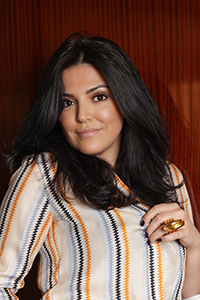 At its helm is Zineb Faress, a hospitality entrepreneur with a clear mission: to raise the profile of Moroccan gourmet products on the international stage through uncompromising quality, ethical sourcing, and exceptional storytelling.
At its helm is Zineb Faress, a hospitality entrepreneur with a clear mission: to raise the profile of Moroccan gourmet products on the international stage through uncompromising quality, ethical sourcing, and exceptional storytelling.
While many luxury food brands borrow aesthetics from world cultures, Raphia is firmly rooted in authenticity. Its offerings are not reinterpretations they are direct imports from family-run farms, women’s co-operatives, and generational ateliers across Morocco, repackaged for the luxury consumer.
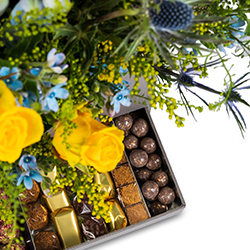 A product of place and trade
A product of place and trade
Raphia’s catalogue reads like a love letter to Morocco’s agricultural and artisanal legacy. All of their ingredients are meticulously sourced from Morocco’s most revered food-producing regions. But what elevates Raphia from gourmet brand to cultural ambassador is the rigour with which Zineb and her team curate their supplier relationships.
“We’re not just importing flavours, we’re importing centuries of skill,” says Zineb. “Every partnership is rooted in sustainability, ethical sourcing, and deep mutual respect. These aren’t vendors, they’re collaborators.”
The result is a brand that doesn’t merely nod to Moroccan influence but sustains its agricultural economy and creates export pathways for rural producers; particularly women.
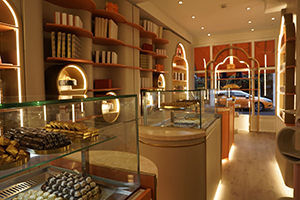 A vertical approach to luxury supply chain
A vertical approach to luxury supply chain
Raphia’s operations are defined by a near-vertical integration model. Ingredients are sourced directly and processed locally in Morocco before final packaging and assembly in London. This approach ensures both traceability and freshness while allowing Raphia to exert complete control over quality, flavour integrity, and cultural accuracy.
In a market increasingly concerned with transparency, Raphia’s vertical supply chain is a strategic advantage. Consumers today want to know not just what they’re eating, but who made it, how, and why. From date farmers in Errachidia to nougat makers in Fez, every product has a name, a story, and a place of origin.
“We view our confectionery as more than product, it’s a trade route,” Zineb explains. “We’re exporting Morocco’s soul in edible form, and importing admiration for its craftsmanship back into Europe.”
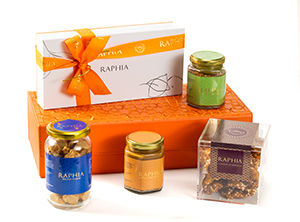 From boutique to global gifting economy
From boutique to global gifting economy
Originally envisioned as a boutique gifting studio, Raphia has quickly evolved into a major player in the luxury corporate gifting space. Its bespoke hampers and seasonal collections are now supplied to five-star hotels, international banks, private family offices, and luxury retailers who seek authentic, ethical alternatives to mass-produced confectionery.
But beneath the polished surface lies a calculated commercial model. With Morocco investing heavily in food exports, especially in the organic, heritage, and wellness sectors brands like Raphia play a vital role in globalising niche Moroccan ingredients. By positioning things like medjool dates, saffron, orange blossom, and almonds as prestige products, Raphia contributes to raising both export value and cultural cachet.
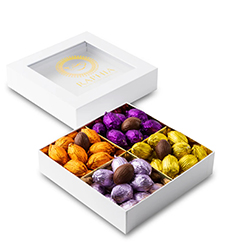 The art of edible diplomacy
The art of edible diplomacy
As Europe and North Africa deepen trade ties, food remains one of the most powerful soft-power tools and Raphia is a case study in edible diplomacy. Its products have been featured at diplomatic events, gallery openings, and luxury product launches, often as a subtle but powerful gesture of cultural storytelling.
What makes this work is balance: Raphia modernises without diluting. Its packaging is minimal yet elegant, designed in London to appeal to global luxury consumers. Yet the contents, such as almond macarons dusted with lemon zest and powdered sugar or gazelle horn pastries laced with orange blossom, remain unapologetically Moroccan in character.
It’s a lesson in duality: global polish, local soul.
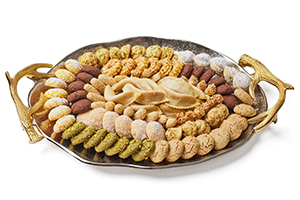 What’s next for Raphia?
What’s next for Raphia?
With interest growing in functional foods and heritage ingredients, Raphia is exploring expansion into high-end hospitality, wellness gifting, and international stockists. Early conversations are underway with department stores internationally markets that value both provenance and prestige.
It’s a sign that this brand isn’t just here for seasonal luxury, it’s building a lasting, trade-rooted legacy.
Final taste
Raphia is proof that luxury food can be meaningful trade. It’s a brand built not only on elegance, but on economic empowerment and cross-continental collaboration. In a world flooded with fusion and surface-level aestheticism, Raphia offers something far more enduring: culinary heritage, fairly traded and exquisitely delivered.
From the soil of Morocco to the tables of London, every bite tells a story of place, pride, and purpose. This is Moroccan gastronomy, unfiltered, uncompromising, and finally, receiving the global recognition it deserves.
